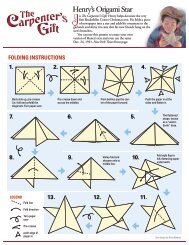Download file (BookThief_Chapter_Sampl_Excerpt.pdf)
Download file (BookThief_Chapter_Sampl_Excerpt.pdf)
Download file (BookThief_Chapter_Sampl_Excerpt.pdf)
You also want an ePaper? Increase the reach of your titles
YUMPU automatically turns print PDFs into web optimized ePapers that Google loves.
<strong>Chapter</strong><br />
<strong>Sampl</strong>er
Praise for The Book Thief<br />
“Thought-provoking, life-affirming, triumphant and tragic, this is a novel<br />
of breathtaking scope, masterfully told. It is an important piece of work,<br />
but also a wonderful page-turner.”<br />
—The Guardian (UK)<br />
“This is a stunning book, seemingly channeled from a rare, artistic muse.”<br />
—Seattle Post-Intelligencer<br />
“[A] haunting tale [that] will steal your heart.”<br />
—The Miami Herald<br />
“One of the most highly anticipated young-adult books in years.”<br />
—The Wall Street Journal<br />
“Intricate and extraordinary.”<br />
—Newsday<br />
“An absorbing and searing narrative.”<br />
—Orlando Sentinel<br />
“Lyrical and moving.”<br />
—San Francisco Chronicle<br />
“This fabulous novel is rich, complicated and wise enough to satisfy<br />
a reader of any age.”<br />
—The Atlanta Journal-Constitution<br />
“[B]oth gripping and touching, a work that kept me up late into the<br />
night feverishly reading the last 300 pages. You can’t ask for much<br />
more than that.”<br />
—The Plain Dealer (Cleveland)<br />
“A remarkable read.”<br />
—The Sacramento Bee<br />
“This is a brilliant look at the wartime lives of ordinary decent people.”<br />
—St. Louis Post-Dispatch<br />
“This is virtuoso work. Zusak exhibits the kind of mastery and peak<br />
power Kurt Vonnegut showed in his wartime tale ‘Slaughterhouse-Five.’”<br />
—The Grand Rapids Press<br />
“It’s the book to pick up for people who love to read.”<br />
—The Florida Times-Union
“Remarkable, just plain remarkable.”<br />
—The Anniston Star<br />
“Subtle, simple, yet vividly imagined.”<br />
—Teen Vogue<br />
★ “Beautiful and important.”<br />
—Kirkus Reviews, Starred<br />
★ “Exquisitely written. . . . A tour de force to be not just read but<br />
inhabited.”<br />
—The Horn Book Magazine, Starred<br />
★ “It’s a book of greatness.”<br />
—The Bulletin, Starred<br />
★ “An extraordinary narrative.”<br />
—School Library Journal, Starred<br />
★ “An achievement.”<br />
—Publishers Weekly, Starred<br />
Winner of the Book Sense Book of the Year Award<br />
for Children’s Literature<br />
Winner of the Michael L. Printz Honor Book Award for Excellence<br />
in Young Adult Literature<br />
Winner of the National Jewish Book Award<br />
Winner of the Association of Jewish Libraries Teen Book Award<br />
A Quill Award Nominee<br />
A Publishers Weekly Best Book of the Year<br />
A Kirkus Reviews Editor’s Choice<br />
A Horn Book Fanfare<br />
A School Library Journal Best Book of the Year<br />
A Booklist Editors’ Choice<br />
A Bulletin Blue Ribbon Book<br />
An ALA Notable Book<br />
An ALA Top Ten Best Book for Young Adults
y markus zusak<br />
Alfred A. Knopf<br />
New York
PROLOGUE<br />
a mountain range of rubble<br />
in which our narrator introduces:<br />
himself—the colors—and the book thief<br />
1
D EAT H A N D C H O C O LAT E<br />
First the colors.<br />
Then the humans.<br />
That’s usually how I see things.<br />
Or at least, how I try.<br />
* * * HERE IS A SMALL FACT * * *<br />
You are going to die.<br />
I am in all truthfulness attempting to be cheerful about this whole<br />
topic, though most people find themselves hindered in believing me,<br />
no matter my protestations. Please, trust me. I most definitely can be<br />
cheerful. I can be amiable. Agreeable. Affable. And that’s only the A’s.<br />
Just don’t ask me to be nice. Nice has nothing to do with me.<br />
* * * REACTION TO THE * * *<br />
AFOREMENTIONED FACT<br />
Does this worry you?<br />
I urge you—don’t be afraid.<br />
I’m nothing if not fair.<br />
32
—Of course, an introduction.<br />
A beginning.<br />
Where are my manners?<br />
I could introduce myself properly, but it’s not really necessary. You<br />
will know me well enough and soon enough, depending on a diverse<br />
range of variables. It suffices to say that at some point in time, I will be<br />
standing over you, as genially as possible. Your soul will be in my arms.<br />
A color will be perched on my shoulder. I will carry you gently away.<br />
At that moment, you will be lying there (I rarely find people<br />
standing up). You will be caked in your own body. There might be a<br />
discovery; a scream will dribble down the air. The only sound I’ll hear<br />
after that will be my own breathing, and the sound of the smell, of my<br />
footsteps.<br />
The question is, what color will everything be at that moment<br />
when I come for you? What will the sky be saying?<br />
Personally, I like a chocolate-colored sky. Dark, dark chocolate. People<br />
say it suits me. I do, however, try to enjoy every color I see—the<br />
whole spectrum. Abillion or so flavors, none of them quite the same, and<br />
a sky to slowly suck on. It takes the edge off the stress. It helps me relax.<br />
* * * A SMALL THEORY * * *<br />
People observe the colors of a day only at its beginnings and<br />
ends, but to me it’s quite clear that a day merges through a<br />
multitude of shades and intonations, with each passing<br />
moment. A single hour can consist of thousands of different<br />
colors. Waxy yellows, cloud-spat blues. Murky darknesses.<br />
In my line of work, I make it a point to notice them.<br />
As I’ve been alluding to, my one saving grace is distraction. It keeps<br />
me sane. It helps me cope, considering the length of time I’ve been<br />
43
performing this job. The trouble is, who could ever replace me? Who<br />
could step in while I take a break in your stock-standard resort-style<br />
vacation destination, whether it be tropical or of the ski trip variety?<br />
The answer, of course, is nobody, which has prompted me to make a<br />
conscious, deliberate decision—to make distraction my vacation.<br />
Needless to say, I vacation in increments. In colors.<br />
Still, it’s possible that you might be asking, why does he even<br />
need a vacation? What does he need distraction from?<br />
Which brings me to my next point.<br />
It’s the leftover humans.<br />
The survivors.<br />
They’re the ones I can’t stand to look at, although on many occasions<br />
I still fail. I deliberately seek out the colors to keep my mind off<br />
them, but now and then, I witness the ones who are left behind,<br />
crumbling among the jigsaw puzzle of realization, despair, and surprise.<br />
They have punctured hearts. They have beaten lungs.<br />
Which in turn brings me to the subject I am telling you about<br />
tonight, or today, or whatever the hour and color. It’s the story of one<br />
of those perpetual survivors—an expert at being left behind.<br />
It’s just a small story really, about, among other things:<br />
* A girl<br />
* Some words<br />
* An accordionist<br />
* Some fanatical Germans<br />
* A Jewish fist fighter<br />
* And quite a lot of thievery<br />
I saw the book thief three times.<br />
54
BESIDE THE RAILWAY LINE<br />
First up is something white. Of the blinding kind.<br />
Some of you are most likely thinking that white is not really a<br />
color and all of that tired sort of nonsense. Well, I’m here to tell you<br />
that it is. White is without question a color, and personally, I don’t<br />
think you want to argue with me.<br />
* * * A REASSURING ANNOUNCEMENT * * *<br />
Please, be calm, despite that previous threat.<br />
I am all bluster—<br />
I am not violent.<br />
I am not malicious.<br />
I am a result.<br />
Yes, it was white.<br />
It felt as though the whole globe was dressed in snow. Like it had<br />
pulled it on, the way you pull on a sweater. Next to the train line, footprints<br />
were sunken to their shins. Trees wore blankets of ice.<br />
As you might expect, someone had died.<br />
65
• • •<br />
They couldn’t just leave him on the ground. For now, it wasn’t such a<br />
problem, but very soon, the track ahead would be cleared and the<br />
train would need to move on.<br />
There were two guards.<br />
There was one mother and her daughter.<br />
One corpse.<br />
The mother, the girl, and the corpse remained stubborn and<br />
silent.<br />
“Well, what else do you want me to do?”<br />
The guards were tall and short. The tall one always spoke first,<br />
though he was not in charge. He looked at the smaller, rounder one.<br />
The one with the juicy red face.<br />
“Well,” was the response, “we can’t just leave them like this, can<br />
we?”<br />
The tall one was losing patience. “Why not?”<br />
And the smaller one damn near exploded. He looked up at the<br />
tall one’s chin and cried, “Spinnst du?! Are you stupid?!” The abhorrence<br />
on his cheeks was growing thicker by the moment. His skin<br />
widened. “Come on,” he said, traipsing over the snow. “We’ll carry all<br />
three of them back on if we have to. We’ll notify the next stop.”<br />
As for me, I had already made the most elementary of mistakes. I<br />
can’t explain to you the severity of my self-disappointment. Originally,<br />
I’d done everything right:<br />
I studied the blinding, white-snow sky who stood at the window<br />
of the moving train. I practically inhaled it, but still, I wavered. I<br />
buckled—I became interested. In the girl. Curiosity got the better of<br />
me, and I resigned myself to stay as long as my schedule allowed, and<br />
I watched.<br />
76
Twenty-three minutes later, when the train was stopped, I<br />
climbed out with them.<br />
A small soul was in my arms.<br />
I stood a little to the right.<br />
The dynamic train guard duo made their way back to the mother, the<br />
girl, and the small male corpse. I clearly remember that my breath<br />
was loud that day. I’m surprised the guards didn’t notice me as they<br />
walked by. The world was sagging now, under the weight of all that<br />
snow.<br />
Perhaps ten meters to my left, the pale, empty-stomached girl<br />
was standing, frost-stricken.<br />
Her mouth jittered.<br />
Her cold arms were folded.<br />
Tears were frozen to the book thief ’s face.<br />
87
THE ECLIPSE<br />
Next is a signature black, to show the poles of my versatility, if you<br />
like. It was the darkest moment before the dawn.<br />
This time, I had come for a man of perhaps twenty-four years of<br />
age. It was a beautiful thing in some ways. The plane was still coughing.<br />
Smoke was leaking from both its lungs.<br />
When it crashed, three deep gashes were made in the earth. Its<br />
wings were now sawn-off arms. No more flapping. Not for this metallic<br />
little bird.<br />
* * * SOME OTHER SMALL FACTS * * *<br />
Sometimes I arrive too early.<br />
I rush,<br />
and some people cling longer<br />
to life than expected.<br />
After a small collection of minutes, the smoke exhausted itself. There<br />
was nothing left to give.<br />
98
A boy arrived first, with cluttered breath and what appeared to<br />
be a toolbox. With great trepidation, he approached the cockpit and<br />
watched the pilot, gauging if he was alive, at which point, he still was.<br />
The book thief arrived perhaps thirty seconds later.<br />
Years had passed, but I recognized her.<br />
She was panting.<br />
From the toolbox, the boy took out, of all things, a teddy bear.<br />
He reached in through the torn windshield and placed it on the<br />
pilot’s chest. The smiling bear sat huddled among the crowded<br />
wreckage of the man and the blood. A few minutes later, I took my<br />
chance. The time was right.<br />
I walked in, loosened his soul, and carried it gently away.<br />
All that was left was the body, the dwindling smell of smoke, and<br />
the smiling teddy bear.<br />
As the crowd arrived in full, things, of course, had changed. The horizon<br />
was beginning to charcoal. What was left of the blackness above<br />
was nothing now but a scribble, and disappearing fast.<br />
The man, in comparison, was the color of bone. Skeleton-colored<br />
skin. A ruffled uniform. His eyes were cold and brown—like coffee<br />
stains—and the last scrawl from above formed what, to me, appeared<br />
an odd, yet familiar, shape. A signature.<br />
The crowd did what crowds do.<br />
As I made my way through, each person stood and played with<br />
the quietness of it. It was a small concoction of disjointed hand movements,<br />
muffled sentences, and mute, self-conscious turns.<br />
When I glanced back at the plane, the pilot’s open mouth appeared<br />
to be smiling.<br />
A final dirty joke.<br />
Another human punch line.<br />
109
He remained shrouded in his uniform as the graying light armwrestled<br />
the sky. As with many of the others, when I began my journey<br />
away, there seemed a quick shadow again, a final moment of<br />
eclipse—the recognition of another soul gone.<br />
You see, to me, for just a moment, despite all of the colors that<br />
touch and grapple with what I see in this world, I will often catch an<br />
eclipse when a human dies.<br />
I’ve seen millions of them.<br />
I’ve seen more eclipses than I care to remember.<br />
10 11
THE FLAG<br />
The last time I saw her was red. The sky was like soup, boiling and<br />
stirring. In some places, it was burned. There were black crumbs, and<br />
pepper, streaked across the redness.<br />
Earlier, kids had been playing hopscotch there, on the street that<br />
looked like oil-stained pages. When I arrived, I could still hear the<br />
echoes. The feet tapping the road. The children-voices laughing, and<br />
the smiles like salt, but decaying fast.<br />
Then, bombs.<br />
This time, everything was too late.<br />
The sirens. The cuckoo shrieks in the radio. All too late.<br />
Within minutes, mounds of concrete and earth were stacked and<br />
piled. The streets were ruptured veins. Blood streamed till it was<br />
dried on the road, and the bodies were stuck there, like driftwood after<br />
the flood.<br />
They were glued down, every last one of them. A packet of souls.<br />
Was it fate?<br />
11 12
Misfortune?<br />
Is that what glued them down like that?<br />
Of course not.<br />
Let’s not be stupid.<br />
It probably had more to do with the hurled bombs, thrown down<br />
by humans hiding in the clouds.<br />
Yes, the sky was now a devastating, home-cooked red. The<br />
small German town had been flung apart one more time.<br />
Snowflakes of ash fell so lovelily you were tempted to stretch out<br />
your tongue to catch them, taste them. Only, they would have<br />
scorched your lips. They would have cooked your mouth.<br />
Clearly, I see it.<br />
I was just about to leave when I found her kneeling there.<br />
A mountain range of rubble was written, designed, erected<br />
around her. She was clutching at a book.<br />
Apart from everything else, the book thief wanted desperately to go<br />
back to the basement, to write, or to read through her story one last<br />
time. In hindsight, I see it so obviously on her face. She was dying for it—<br />
the safety of it, the home of it—but she could not move. Also, the basement<br />
didn’t even exist anymore. It was part of the mangled landscape.<br />
Please, again, I ask you to believe me.<br />
I wanted to stop. To crouch down.<br />
I wanted to say:<br />
“I’m sorry, child.”<br />
But that is not allowed.<br />
I did not crouch down. I did not speak.<br />
Instead, I watched her awhile. When she was able to move, I followed<br />
her.<br />
12 13
• • •<br />
She dropped the book.<br />
She knelt.<br />
The book thief howled.<br />
Her book was stepped on several times as the cleanup began, and although<br />
orders were given only to clear the mess of concrete, the girl’s<br />
most precious item was thrown aboard a garbage truck, at which<br />
point I was compelled. I climbed aboard and took it in my hand, not<br />
realizing that I would keep it and view it several thousand times over<br />
the years. I would watch the places where we intersect, and marvel at<br />
what the girl saw and how she survived. That is the best I can do—<br />
watch it fall into line with everything else I spectated during that<br />
time.<br />
When I recollect her, I see a long list of colors, but it’s the three in<br />
which I saw her in the flesh that resonate the most. Sometimes I<br />
manage to float far above those three moments. I hang suspended,<br />
until a septic truth bleeds toward clarity.<br />
That’s when I see them formulate.<br />
* * * THE COLORS * * *<br />
RED: WHITE: BLACK:<br />
They fall on top of each other. The scribbled signature black, onto<br />
the blinding global white, onto the thick soupy red.<br />
Yes, often, I am reminded of her, and in one of my vast array of<br />
pockets, I have kept her story to retell. It is one of the small legion I<br />
carry, each one extraordinary in its own right. Each one an attempt—<br />
13 14
an immense leap of an attempt—to prove to me that you, and your<br />
human existence, are worth it.<br />
Here it is. One of a handful.<br />
The Book Thief.<br />
If you feel like it, come with me. I will tell you a story.<br />
I’ll show you something.<br />
14 15
PA RT O N E<br />
the grave digger’s handbook<br />
featuring:<br />
himmel street—the art of saumensching—an ironfisted<br />
woman—a kiss attempt—jesse owens—<br />
sandpaper—the smell of friendship—a heavyweight<br />
champion—and the mother of all watschens
ARRIVAL ON HIMMEL STREET<br />
That last time.<br />
That red sky . . .<br />
How does a book thief end up kneeling and howling and flanked by<br />
a man-made heap of ridiculous, greasy, cooked-up rubble?<br />
Years earlier, the start was snow.<br />
The time had come. For one.<br />
* * * A SPECTACULARLY TRAGIC MOMENT * * *<br />
A train was moving quickly.<br />
It was packed with humans.<br />
A six-year-old boy died in the third carriage.<br />
The book thief and her brother were traveling down toward Munich,<br />
where they would soon be given over to foster parents. We now know,<br />
of course, that the boy didn’t make it.<br />
16 19
* * * HOW IT HAPPENED * * *<br />
There was an intense spurt of coughing.<br />
Almost an inspired spurt.<br />
And soon after—nothing.<br />
When the coughing stopped, there was nothing but the nothingness<br />
of life moving on with a shuffle, or a near-silent twitch. A suddenness<br />
found its way onto his lips then, which were a corroded brown color<br />
and peeling, like old paint. In desperate need of redoing.<br />
Their mother was asleep.<br />
I entered the train.<br />
My feet stepped through the cluttered aisle and my palm was<br />
over his mouth in an instant.<br />
No one noticed.<br />
The train galloped on.<br />
Except the girl.<br />
With one eye open, one still in a dream, the book thief—also known<br />
as Liesel Meminger—could see without question that her younger<br />
brother, Werner, was now sideways and dead.<br />
His blue eyes stared at the floor.<br />
Seeing nothing.<br />
Prior to waking up, the book thief was dreaming about the Führer,<br />
Adolf Hitler. In the dream, she was attending a rally at which he<br />
spoke, looking at the skull-colored part in his hair and the perfect<br />
square of his mustache. She was listening contentedly to the torrent<br />
of words spilling from his mouth. His sentences glowed in the light.<br />
In a quieter moment, he actually crouched down and smiled at her.<br />
She returned the smile and said, “Guten Tag, Herr Führer. Wie geht’s dir<br />
20 17
heut?” She hadn’t learned to speak too well, or even to read, as she had<br />
rarely frequented school. The reason for that she would find out in<br />
due course.<br />
Just as the Führer was about to reply, she woke up.<br />
It was January 1939. She was nine years old, soon to be ten.<br />
Her brother was dead.<br />
One eye open.<br />
One still in a dream.<br />
It would be better for a complete dream, I think, but I really have<br />
no control over that.<br />
The second eye jumped awake and she caught me out, no doubt<br />
about it. It was exactly when I knelt down and extracted his soul,<br />
holding it limply in my swollen arms. He warmed up soon after, but<br />
when I picked him up originally, the boy’s spirit was soft and cold, like<br />
ice cream. He started melting in my arms. Then warming up completely.<br />
Healing.<br />
For Liesel Meminger, there was the imprisoned stiffness of<br />
movement and the staggered onslaught of thoughts. Es stimmt nicht.<br />
This isn’t happening. This isn’t happening.<br />
And the shaking.<br />
Why do they always shake them?<br />
Yes, I know, I know, I assume it has something to do with instinct.<br />
To stem the flow of truth. Her heart at that point was slippery<br />
and hot, and loud, so loud so loud.<br />
Stupidly, I stayed. I watched.<br />
Next, her mother.<br />
She woke her up with the same distraught shake.<br />
If you can’t imagine it, think clumsy silence. Think bits and<br />
pieces of floating despair. And drowning in a train.<br />
18 21
• • •<br />
Snow had been falling consistently, and the service to Munich was<br />
forced to stop due to faulty track work. There was a woman wailing.<br />
A girl stood numbly next to her.<br />
In panic, the mother opened the door.<br />
She climbed down into the snow, holding the small body.<br />
What could the girl do but follow?<br />
As you’ve been informed, two guards also exited the train. They<br />
discussed and argued over what to do. The situation was unsavory<br />
to say the least. It was eventually decided that all three of them<br />
should be taken to the next township and left there to sort things<br />
out.<br />
This time, the train limped through the snowed-in country.<br />
It hobbled in and stopped.<br />
They stepped onto the platform, the body in her mother’s<br />
arms.<br />
They stood.<br />
The boy was getting heavy.<br />
Liesel had no idea where she was. All was white, and as they remained<br />
at the station, she could only stare at the faded lettering of the sign in<br />
front of her. For Liesel, the town was nameless, and it was there that<br />
her brother, Werner, was buried two days later. Witnesses included a<br />
priest and two shivering grave diggers.<br />
* * * AN OBSERVATION * * *<br />
A pair of train guards.<br />
A pair of grave diggers.<br />
19 22
When it came down to it, one of them called the shots.<br />
The other did what he was told.<br />
The question is, what if the other is a lot more than one?<br />
Mistakes, mistakes, it’s all I seem capable of at times.<br />
For two days, I went about my business. I traveled the globe as always,<br />
handing souls to the conveyor belt of eternity. I watched them<br />
trundle passively on. Several times, I warned myself that I should<br />
keep a good distance from the burial of Liesel Meminger’s brother. I<br />
did not heed my advice.<br />
From miles away, as I approached, I could already see the small<br />
group of humans standing frigidly among the wasteland of snow. The<br />
cemetery welcomed me like a friend, and soon, I was with them. I<br />
bowed my head.<br />
Standing to Liesel’s left, the grave diggers were rubbing their hands<br />
together and whining about the snow and the current digging conditions.<br />
“So hard getting through all the ice,” and so forth. One of them<br />
couldn’t have been more than fourteen. An apprentice. When he<br />
walked away, after a few dozen paces, a black book fell innocuously<br />
from his coat pocket without his knowledge.<br />
A few minutes later, Liesel’s mother started leaving with the priest.<br />
She was thanking him for his performance of the ceremony.<br />
The girl, however, stayed.<br />
Her knees entered the ground. Her moment had arrived.<br />
Still in disbelief, she started to dig. He couldn’t be dead. He<br />
couldn’t be dead. He couldn’t—<br />
Within seconds, snow was carved into her skin.<br />
Frozen blood was cracked across her hands.<br />
2023
Somewhere in all the snow, she could see her broken heart, in two<br />
pieces. Each half was glowing, and beating under all that white. She<br />
realized her mother had come back for her only when she felt the<br />
boniness of a hand on her shoulder. She was being dragged away.<br />
A warm scream filled her throat.<br />
* * * A SMALL IMAGE, PERHAPS * * *<br />
TWENTY METERS AWAY<br />
When the dragging was done, the mother and<br />
the girl stood and breathed.<br />
There was something black and rectangular<br />
lodged in the snow.<br />
Only the girl saw it.<br />
She bent down and picked it up and<br />
held it firmly in her fingers.<br />
The book had silver writing on it.<br />
They held hands.<br />
A final, soaking farewell was let go of, and they turned and left<br />
the cemetery, looking back several times.<br />
As for me, I remained a few moments longer.<br />
I waved.<br />
No one waved back.<br />
Mother and daughter vacated the cemetery and made their way<br />
toward the next train to Munich.<br />
Both were skinny and pale.<br />
Both had sores on their lips.<br />
Liesel noticed it in the dirty, fogged-up window of the train when<br />
21 24
they boarded just before midday. In the written words of the book<br />
thief herself, the journey continued like everything had happened.<br />
When the train pulled into the Bahnhof in Munich, the passengers<br />
slid out as if from a torn package. There were people of every<br />
stature, but among them, the poor were the most easily recognized.<br />
The impoverished always try to keep moving, as if relocating might<br />
help. They ignore the reality that a new version of the same old<br />
problem will be waiting at the end of the trip—the relative you<br />
cringe to kiss.<br />
I think her mother knew this quite well. She wasn’t delivering her<br />
children to the higher echelons of Munich, but a foster home had apparently<br />
been found, and if nothing else, the new family could at least<br />
feed the girl and the boy a little better, and educate them properly.<br />
The boy.<br />
Liesel was sure her mother carried the memory of him, slung<br />
over her shoulder. She dropped him. She saw his feet and legs and<br />
body slap the platform.<br />
How could that woman walk?<br />
How could she move?<br />
That’s the sort of thing I’ll never know, or comprehend—what<br />
humans are capable of.<br />
She picked him up and continued walking, the girl clinging now<br />
to her side.<br />
Authorities were met and questions of lateness and the boy raised<br />
their vulnerable heads. Liesel remained in the corner of the small,<br />
dusty office as her mother sat with clenched thoughts on a very hard<br />
chair.<br />
There was the chaos of goodbye.<br />
It was a goodbye that was wet, with the girl’s head buried into the<br />
22 25
woolly, worn shallows of her mother’s coat. There had been some<br />
more dragging.<br />
Quite a way beyond the outskirts of Munich, there was a town<br />
called Molching, said best by the likes of you and me as “Molking.”<br />
That’s where they were taking her, to a street by the name of<br />
Himmel.<br />
* * * ATRANSLATION * * *<br />
Himmel = Heaven<br />
Whoever named Himmel Street certainly had a healthy sense of<br />
irony. Not that it was a living hell. It wasn’t. But it sure as hell wasn’t<br />
heaven, either.<br />
Regardless, Liesel’s foster parents were waiting.<br />
The Hubermanns.<br />
They’d been expecting a girl and a boy and would be paid a small<br />
allowance for having them. Nobody wanted to be the one to tell Rosa<br />
Hubermann that the boy didn’t survive the trip. In fact, no one ever<br />
really wanted to tell her anything. As far as dispositions go, hers<br />
wasn’t really enviable, although she had a good record with foster kids<br />
in the past. Apparently, she’d straightened a few out.<br />
For Liesel, it was a ride in a car.<br />
She’d never been in one before.<br />
There was the constant rise and fall of her stomach, and the<br />
futile hopes that they’d lose their way or change their minds.<br />
Among it all, her thoughts couldn’t help turning toward her mother,<br />
back at the Bahnhof, waiting to leave again. Shivering. Bundled up<br />
in that useless coat. She’d be eating her nails, waiting for the train.<br />
The platform would be long and uncomfortable—a slice of cold ce-<br />
23 26
ment. Would she keep an eye out for the approximate burial site of<br />
her son on the return trip? Or would sleep be too heavy?<br />
The car moved on, with Liesel dreading the last, lethal turn.<br />
The day was gray, the color of Europe.<br />
Curtains of rain were drawn around the car.<br />
“Nearly there.” The foster care lady, Frau Heinrich, turned<br />
around and smiled. “Dein neues Heim. Your new home.”<br />
Liesel made a clear circle on the dribbled glass and looked out.<br />
* * * A PHOTO OF HIMMEL STREET * * *<br />
The buildings appear to be glued together, mostly small houses<br />
and apartment blocks that look nervous.<br />
There is murky snow spread out like carpet.<br />
There is concrete, empty hat-stand trees, and gray air.<br />
A man was also in the car. He remained with the girl while Frau Heinrich<br />
disappeared inside. He never spoke. Liesel assumed he was there<br />
to make sure she wouldn’t run away or to force her inside if she gave<br />
them any trouble. Later, however, when the trouble did start, he simply<br />
sat there and watched. Perhaps he was only the last resort, the final<br />
solution.<br />
After a few minutes, a very tall man came out. Hans Hubermann,<br />
Liesel’s foster father. On one side of him was the medium-height Frau<br />
Heinrich. On the other was the squat shape of Rosa Hubermann,<br />
who looked like a small wardrobe with a coat thrown over it. There<br />
was a distinct waddle to her walk. Almost cute, if it wasn’t for her face,<br />
which was like creased-up cardboard and annoyed, as if she was<br />
merely tolerating all of it. Her husband walked straight, with a cigarette<br />
smoldering between his fingers. He rolled his own.<br />
24 27
• • •<br />
The fact was this:<br />
Liesel would not get out of the car.<br />
“Was ist los mit dem Kind?” Rosa Hubermann inquired. She said it again.<br />
“What’s wrong with this child?” She stuck her face inside the car and<br />
said, “Na, komm. Komm.”<br />
The seat in front was flung forward. A corridor of cold light invited<br />
her out. She would not move.<br />
Outside, through the circle she’d made, Liesel could see the tall<br />
man’s fingers, still holding the cigarette. Ash stumbled from its edge<br />
and lunged and lifted several times until it hit the ground. It took<br />
nearly fifteen minutes to coax her from the car. It was the tall man<br />
who did it.<br />
Quietly.<br />
There was the gate next, which she clung to.<br />
A gang of tears trudged from her eyes as she held on and refused to<br />
go inside. People started to gather on the street until Rosa Hubermann<br />
swore at them, after which they reversed back, whence they came.<br />
* * * ATRANSLATION OF * * *<br />
ROSA HUBERMANN’S ANNOUNCEMENT<br />
“What are you assholes looking at?”<br />
Eventually, Liesel Meminger walked gingerly inside. Hans Hubermann<br />
had her by one hand. Her small suitcase had her by the other.<br />
Buried beneath the folded layer of clothes in that suitcase was a<br />
small black book, which, for all we know, a fourteen-year-old grave<br />
25 28
digger in a nameless town had probably spent the last few hours<br />
looking for. “I promise you,” I imagine him saying to his boss, “I<br />
have no idea what happened to it. I’ve looked everywhere. Everywhere!”<br />
I’m sure he would never have suspected the girl, and yet,<br />
there it was—a black book with silver words written against the ceiling<br />
of her clothes:<br />
* * * THE GRAVE DIGGER’S HANDBOOK * * *<br />
ATwelve-Step Guide to<br />
Grave-Digging Success<br />
Published by the Bayern Cemetery Association<br />
The book thief had struck for the first time—the beginning of an<br />
illustrious career.<br />
26 29
THIS IS A BORZOI BOOK PUBLISHED BY ALFRED A. KNOPF<br />
This is a work of fiction. Names, characters, places, and incidents either are the product<br />
of the author’s imagination or are used fictitiously. Any resemblance to actual persons,<br />
living or dead, events, or locales is entirely coincidental.<br />
Text copyright © 2005 by Markus Zusak<br />
Illustrations copyright © 2005 by Trudy White<br />
Jacket photograph copyright © 2006 by Colin Anderson/Brand X Pictures/Getty Images<br />
All rights reserved.<br />
Published in the United States by Alfred A. Knopf, an imprint of Random House<br />
Children’s Books, a division of Random House, Inc., New York. Originally published in<br />
Australia in 2005 by Picador, an imprint of Pan Macmillan Pty Ltd., Sydney.<br />
KNOPF, BORZOI BOOKS, and the colophon are registered trademarks<br />
of Random House, Inc.<br />
www.randomhouse.com/teens<br />
Educators and librarians, for a variety of teaching tools, visit us at<br />
www.randomhouse.com/teachers<br />
Library of Congress Cataloging-in-Publication Data<br />
Zusak, Markus.<br />
The book thief / by Markus Zusak.<br />
p. cm.<br />
SUMMARY: Trying to make sense of the horrors of World War II, Death relates the story of<br />
Liesel—a young German girl whose book-stealing and story-telling talents help sustain<br />
her family and the Jewish man they are hiding, as well as their neighbors.<br />
ISBN 978-0-375-83100-3 (trade) — ISBN 978-0-375-93100-0 (lib. bdg.) —<br />
ISBN 978-0-375-84220-7 (pbk.)<br />
1. Germany—History—1933–1945—Juvenile fiction. [1. Germany—History—1933–1945—<br />
Fiction. 2. Books and reading—Fiction. 3. Storytelling—Fiction. 4. Death—Fiction.<br />
5. Jews—Germany—History—1933–1945—Fiction. 6. World War, 1939–1945—Jews—<br />
Rescue—Fiction.] I. Title.<br />
PZ7.Z837Boo 2006 [Fic]—dc22 2005008942<br />
Printed in the United States of America<br />
10 9 8 7 6 5 4 3 2 1<br />
First Knopf trade paperback edition September 2007<br />
FREE SAMPLE COPY—NOT FOR SALE<br />
MarkusZusak.com
















